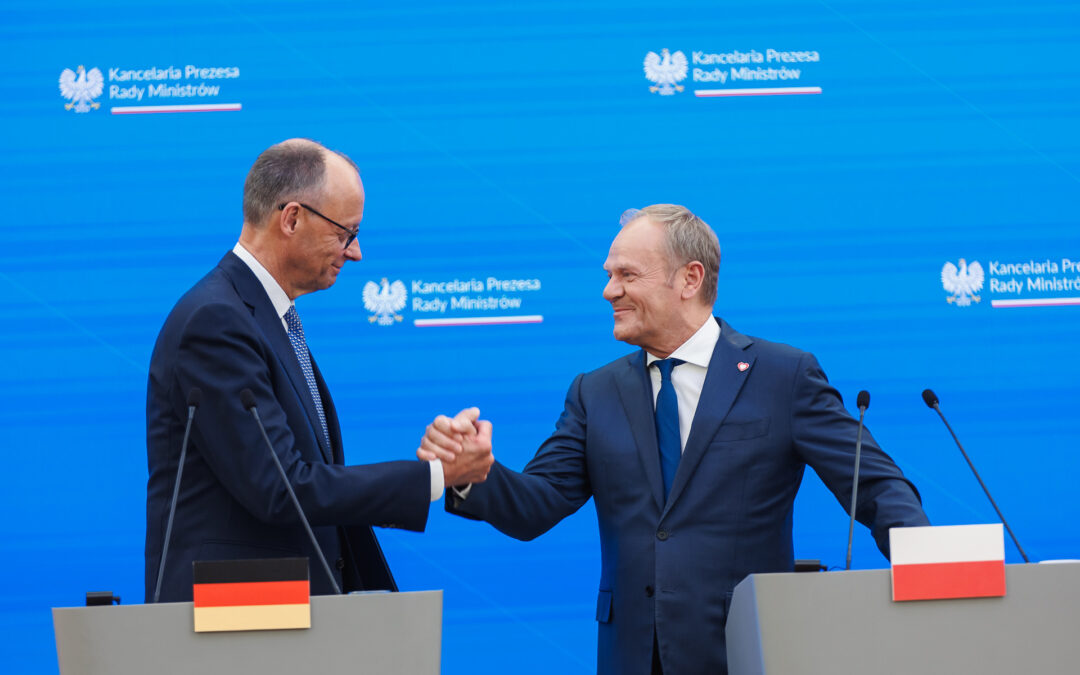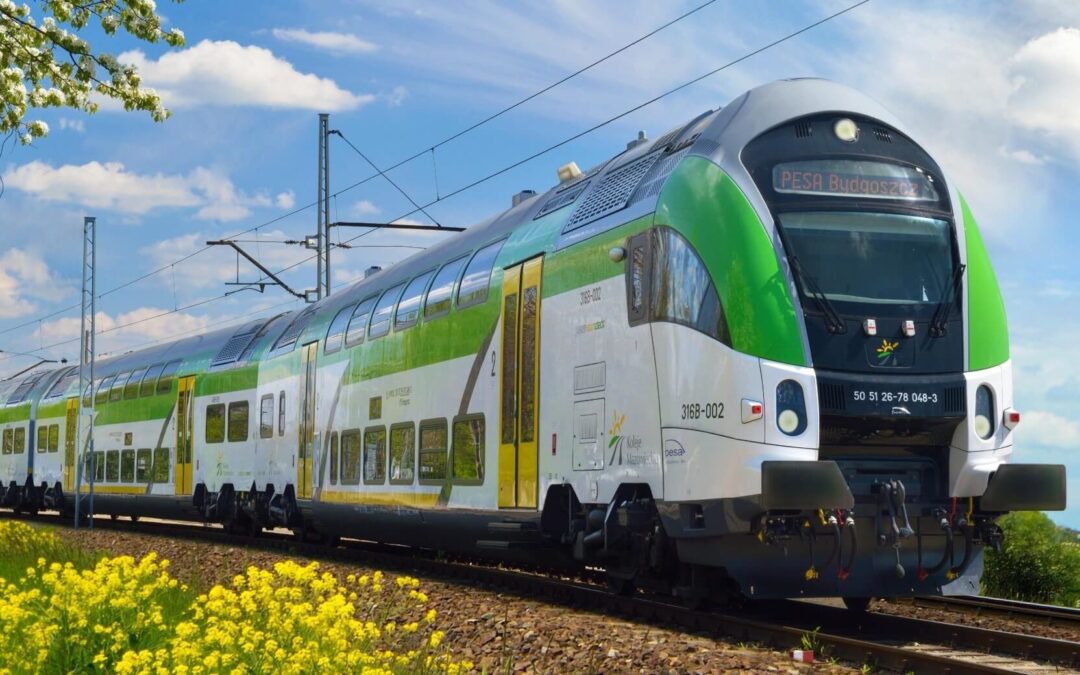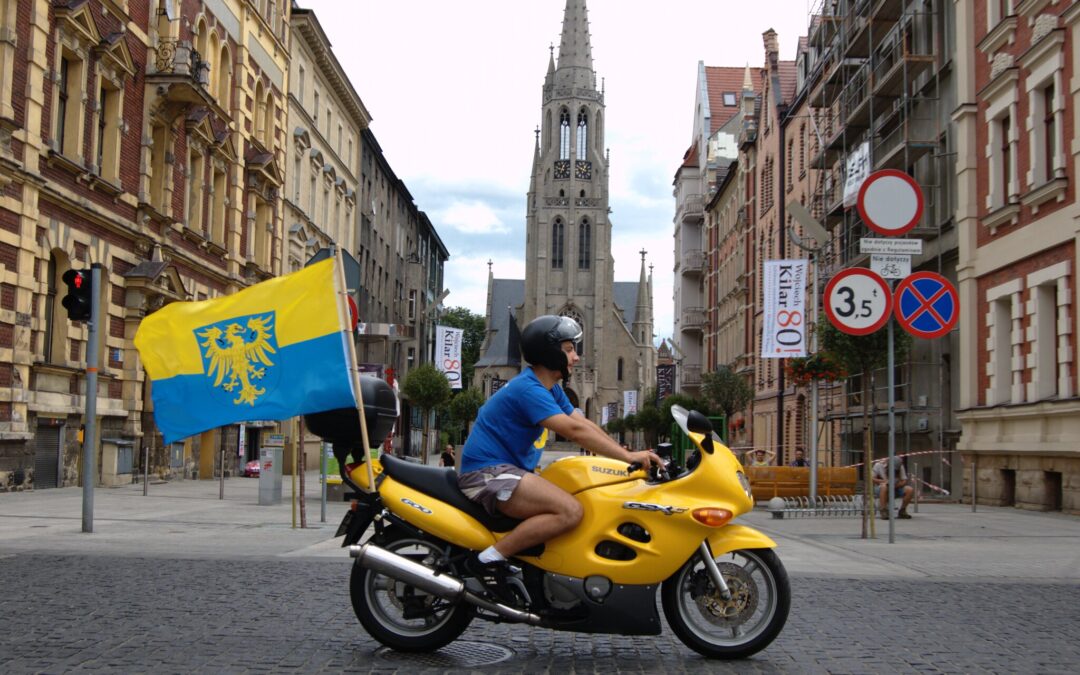Keep our news free from ads and paywalls by making a donation to support our work!

Notes from Poland is run by a small editorial team and is published by an independent, non-profit foundation that is funded through donations from our readers. We cannot do what we do without your support.
Germany’s new chancellor, Friedrich Merz, has visited Poland on his first full day in office for talks with Polish Prime Minister Donald Tusk, who declared a “new beginning in Polish-German relations”.
The pair discussed bolstering security (including extending the presence of German Patriot missiles in Poland) and preventing illegal immigration, as well as war reparations (with both suggesting the issue is closed) and infrastructure investment (especially plans to launch high-speed rail connections between Poland and Germany).
Im Herzen Europas muss eine enge deutsch-polnische Partnerschaft Selbstverständlichkeit sein. Daran arbeiten wir mit aller Kraft! Das sind wir unseren Bürgerinnen und Bürgern und Europa schuldig. Herzlichen Dank für den freundlichen Empfang in Warschau, lieber @DonaldTusk! pic.twitter.com/wJ4UDgbIq4
— Bundeskanzler Friedrich Merz (@bundeskanzler) May 7, 2025
Merz arrived in Warsaw on Wednesday afternoon, making Poland the second country he has visited as chancellor after going to Paris for talks with Emmanuel Macron earlier in the day.
Speaking alongside his German counterpart, Tusk said that, “as a veteran of Polish-German-French work, I am convinced that the future of Europe really depends to a large extent on how this Weimar Triangle will work”, referring to the formal name of the alliance between the three countries.
“I announce a new beginning in Polish-German relations,” said Tusk, quoted by broadcaster TVN. “We have a real chance to strengthen Polish-German relations in such a way that they serve Poland, Germany and Europe in the best possible way.”
Merz paid tribute to the continued legacy of Nazi Germany’s brutal occupation of Poland during World War Two. “Terrible events took place in this city [Warsaw],” he recalled. “We Germans caused our Polish neighbours unspeakable suffering.”
“From this guilt arises a great responsibility that remains and we accept this responsibility,” added the chancellor, quoted by news website Wirtualna Polska. “There can be no common future of our two nations without remembering the past.”
However, on the issue of reparations for wartime destruction, Merz repeated the longstanding German position that “the subject is legally closed”. Whereas Poland’s former conservative government vociferously demanded such reparations, Tusk declared that his administration will not.
“Did Germany ever compensate for the losses, the tragedy of World War Two in Poland? No, of course not,” said Tusk. “I am a historian, I am from Gdańsk, I could talk for hours about how this bill has never been paid, but we will not ask for it. I want to focus on Poland and Germany building a secure future.”
A majority of Poles, 58%, want their country to seek war reparations from Germany while only 20% do not.
The poll comes days after @donaldtusk indicated, following a meeting with @Bundeskanzler, that his government would not pursue reparations https://t.co/HvCmsUPCBL
— Notes from Poland 🇵🇱 (@notesfrompoland) July 8, 2024
Both leaders agreed that building that secure future means tackling the interlinked issues of the threat of Russia and irregular migration, though differences on how to tackle the latter were apparent.
“Russia remains the greatest threat to our security and transatlantic relations,” said Merz. “Poland, as a direct neighbour of Russia and Belarus, is particularly exposed to danger…[and] is making great efforts in this regard and is also doing so for the whole of NATO.”
Tusk, meanwhile, announced that he had proposed to Merz extending the presence of German Patriot missile batteries that were deployed last year to protect the airport in the Polish city of Rzeszów, which is the main hub for equipment and officials travelling in and out of Ukraine.
Germany will move Patriot missile units to Poland next year to support the defence of Polish airspace.
In particular, they will protect "the supply of weapons that Ukraine urgently needs to defend itself against the brutal Russian attacks", says Germany https://t.co/3oiGvsZjjj
— Notes from Poland 🇵🇱 (@notesfrompoland) November 29, 2024
The Polish prime minister also noted that Poland has “taken on the entire burden of protecting the [eastern] border” from irregular migration engineered by Russia and Belarus. Merz declared that the two countries have “a common goal to drastically reduce illegal migration”.
However, Tusk said that Poland’s “concern is maintaining Schengen” and argued that efforts to prevent irregular migration “should be dedicated primarily to the external borders of the European Union”, reports Deutsche Welle. “We expect not only understanding, but full support in these tasks.”
That was a reference to Poland’s opposition to the decision by Germany in 2023 – which remains in force – to introduce controls on its borders with Poland and other countries to prevent illegal entry by migrants.
In his remarks, Merz said that Germany understands that irregular migration is “not a national problem for Germany, it is a common European problem that we want to solve together”. That includes “the obligation to better protect the European external borders, including with the help of Germany”.
He added that he had instructed German interior minister Alexander Dobrindt to “seek an agreement” with the country’s neighbours on this issue.
Official data show that, in the space of 14 months, Germany has returned to Poland over 11,000 migrants who unlawfully crossed the Polish-German border
The issue of such returns has become a hot topic during Poland's ongoing presidential election campaign https://t.co/RSXxg03JWZ
— Notes from Poland 🇵🇱 (@notesfrompoland) April 11, 2025
Finally, the two leaders also expressed support for the idea of creating better infrastructure linking Poland and Germany, in particular high-speed rail connections.
“It must be much easier and faster to travel by train from Warsaw to Berlin, from Berlin to Warsaw, [and] to Paris,” said Tusk. “I am glad that five minutes was enough for us today to tell each other that high-speed rail should connect our countries.”
“I share the demand for better infrastructure between our countries,” replied Merz. “In our coalition agreement [to form] the federal government, we agreed that we will expand the infrastructure to the east in the same way as to the west. We want fast trains to Szczecin, Poznań and Warsaw, just as we can use them to Brussels.”
Poland’s rail network may be better than western Europe's within 20 years and could be the most modern on the continent, says the EU’s top transport official.
He also notes Poland will play a key role in integrating Ukraine into the EU's transport system https://t.co/LyWIy7whd4
— Notes from Poland 🇵🇱 (@notesfrompoland) February 19, 2023

Notes from Poland is run by a small editorial team and published by an independent, non-profit foundation that is funded through donations from our readers. We cannot do what we do without your support.
Main image credit: KPRM/Flickr (under CC BY-NC-ND 2.0)

Daniel Tilles is editor-in-chief of Notes from Poland. He has written on Polish affairs for a wide range of publications, including Foreign Policy, POLITICO Europe, EUobserver and Dziennik Gazeta Prawna.



















